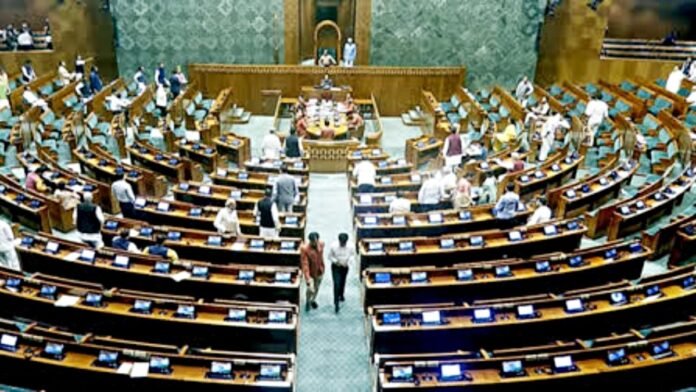
Key Points
- Session ran from July 21 to August 21; proceedings repeatedly disrupted by opposition over multiple issues, with SIR (especially linked to Bihar) dominating demands for debate.
- Lok Sabha adjourned sine die on the final day after sustained protests; Speaker urged “dignified discussion.”
- 12 Bills cleared in Lok Sabha, including the Online Gaming Promotion and Regulation Bill, 2025, which bans real-money online games.
- Home Minister introduced three major bills mid-week, triggering intense protests.
- Constitutional Amendment Bill proposes enabling removal of PM/CM/Ministers upon arrest in serious criminal cases by amending Articles 75, 164, and 239AA.
- Government of Union Territories (Amendment) Bill proposes a clear mechanism to remove arrested UT CMs/Ministers by amending Section 45 of the 1963 Act.
New Delhi: The Monsoon Session of Parliament concluded today after a month marked by frequent disruptions and walkouts. Beginning July 21, the session saw the opposition repeatedly pressing for an in-depth discussion on SIR, with a special focus on developments in Bihar, leading to persistent adjournments, slogan-shouting, and point-of-order clashes. On the final day, the Lok Sabha was adjourned sine die amid continued turmoil, despite repeated appeals from the Chair for orderly debate.
Legislative output: 12 Bills passed despite disruptions
Despite the rancor, the Lok Sabha managed to clear 12 bills. A total of 419 questions were listed, and several short-duration discussions were scheduled, though many were curtailed by disruptions. Speaker Om Birla reiterated the need for “dignified discussion” and constructive participation to ensure accountability and quality lawmaking.
Key bill passed: Online Gaming Promotion and Regulation Bill, 2025
- Scope: Targets online money games betting/wagering formats and platforms involving monetary stakes bringing a complete ban and strong penalties framework.
- Rationale: Addresses addiction, consumer protection, and financial harm; empowers authorities to block apps, restrict payment rail access, and enforce compliance.
- Debate flashpoint: Opposition accused the government of rushing the bill without adequate committee scrutiny; treasury benches cited urgency due to rising public harm.
High-stakes introductions by Home Minister
On Wednesday, the Home Minister tabled three major bills that immediately drew strong opposition protests on grounds of constitutional balance, federalism, and timing. One bill was taken up and passed the online gaming legislation amid the din; the others are slated for further consideration.
The Constitution (One Hundred and Thirtieth Amendment) Bill, 2025
- Objective: Create explicit constitutional provisions to remove a Prime Minister, Union Minister, Chief Minister, or Minister of State upon arrest in a serious criminal case.
- Mechanism: Proposes amending Articles 75 (Union Council of Ministers), 164 (State Council of Ministers), and 239AA (National Capital Territory of Delhi) to provide a uniform, constitutional process.
- Context: Currently, the Constitution does not explicitly stipulate removal in such circumstances; practice relies on political convention, party decisions, or subsequent court outcomes.
- Debate contours:
- Supporters argue this codifies accountability and prevents governance paralysis.
- Critics warn of potential misuse, definitions of “serious” offences, due process concerns, and implications for presumption of innocence.
Government of Union Territories (Amendment) Bill, 2025
- Objective: Amend the Government of Union Territories Act, 1963, to insert clear provisions enabling removal of a Chief Minister or Minister upon arrest in a serious crime.
- Proposed change: An amendment to Section 45 to establish an unambiguous legal pathway for removal, closing a longstanding procedural gap.
- Implications: Brings UT governance rules in line with proposed constitutional norms for states and the Union; raises similar debates around definitions, safeguards, and oversight.
Why the session was turbulent
- SIR debate demand: Opposition parties pressed for a structured, time-bound debate with ministerial answers, alleging the government avoided scrutiny; the government countered that business must proceed and not be held hostage.
- Procedural contention: Frequent protests over scheduling, bill listing, and perceived bypassing of committee review escalated floor-management challenges.
- Political signaling: With state and national political calendars in view, both sides sought to frame the narrative—government on reform and accountability; opposition on transparency and due process.
What’s next
- Committee scrutiny and amendments: Expect calls to refer the constitutional and UT amendment bills to a standing/select committee for clause-by-clause review, definitions (e.g., “serious criminal case”), and robust due-process guardrails.
- Rules and implementation: If the online gaming bill is notified, detailed rules will define enforcement architecture payment blocks, app store takedowns, penalties, and grievance redress.
- Next session dynamics: The tussle over debate time, priority business, and federal balance will likely continue; floor coordination and all-party meetings may be critical to avoid repeated adjournments.
What stakeholders should watch
- Constitutional definitions: How “arrest,” “serious offence,” and “removal” interact with bail, acquittal, and reinstatement; safeguards against politically motivated arrests.
- Federal balance: Impact on Centre–state relations and UT administration, especially in politically contentious territories.
- Digital economy impact: For the gaming sector, clarity on “skills vs. stakes,” transitional provisions, payment compliance, and platform obligations will be key.








































